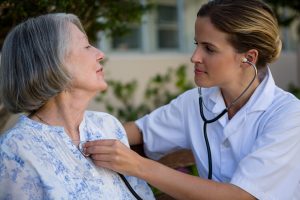Heart disease is the leading cause of death in the United States. [1] This article is designed to help you know what heart disease symptoms to watch for so you can seek emergency help when you need it.
Take note that you will not always experience all of the symptoms listed and some symptoms may not reflect the seriousness of the condition. Also consider your family history of heart disease. Your family history and other conditions (like diabetes) may make you more prone to heart disease. Most of all, know when you should seek emergency medical help for your symptoms. (Spoiler: If you experiencing these symptoms, you should seek medical help!) Please read the following types of diseases and their symptoms carefully.
Most Common Symptoms
There are many different types of heart disease, but many have similar symptoms. [2] [3] Here are the most common heart disease symptoms you need to watch for:
-
- Chest pain, pressure, or discomfort
- Heart palpitations (irregular heartbeat, skipped beats, or fluttering in chest)
- Shortness of breath (especially during physical activity or lying down)
- Pain, numbness, weakness, or coolness in arms and legs
- Pain in neck, jaw, throat, upper abdomen or back
- Dizziness
- Weakness
- Fainting
- Rapid heartbeat
- Swelling in ankles, legs, or abdomen
- Sweating
- Nausea
- Anxiety
- Fever
Coronary Heart Disease
Coronary Heart Disease means that the arteries are narrowed. This is usually caused by the buildup up of cholesterol. It is the most common type of heart disease, accounting for around 370,000 deaths each year in the United States. [4] Common symptoms include:
-
- Angina (chest pain)
- Shortness of breath
- Palpitations (irregular heartbeats)
- Rapid heartbeats
- Weakness or dizziness
- Nausea
- Sweating [2] [3]
Heart Attack

Also known as a myocardial infarction, heart attacks are another major type of heart disease. They are usually caused by a blood clot in the coronary artery. [5] Here are the heart attack symptoms you need to watch for:
-
- Discomfort, pressure or heaviness sin chest, arm, or below breastbone
- Discomfort in back, jaw, throat, or arm
- A squeezing sensation of the heart
- Fullness, indigestion, or chocked feeling (similar to heartburn)
- Sweating
- Nausea
- Vomiting
- Dizziness
- Extreme weakness
- Anxiety
- Shortness of breath
- Rapid or irregular heartbeats
Symptoms usually last 30 minutes to several hours. ALWAYS call 911 or seek emergency medical help if you think you are having a heart attack.
A “silent” myocardial infarction, does not have many symptoms and occurs most often in people with diabetes.If you have diabetes, always seek emergency medical help if you think you are experiencing a heart attack. [2] [3]
Arrhythmia
Arrhythmia is an abnormal heart rhythm. Symptoms may include:
-
- Palpitations (irregular heartbeat, feeling of skipped heartbeats, or uncomfortable fluttering in your chest)
- Pounding in your chest
- Dizziness or feeling light-headed
- Fainting
- Shortness of breath
- Chest discomfort
- Weakness or fatigue [2] [3]
Atrial Fibrillation
Atrial Fibrillation is a type of arrhythmia that can lead to blood clots, strokes, and heart failure. It includes the following symptoms:
-
- Heart palpitations
- Fatigue or lack of energy
- Dizziness
- Feeling faint or light-headed
- Pain, pressure, or discomfort in the chest
- Shortness of breath
Note that some patients have no symptoms and episodes may be brief. [2] [3]
Heart Valve Disease

There are many different types of heart valve disease, but it basically means the valves are not functioning the way that they should. Heart valves normally make sure that blood flows in the right direction. Malfunctioning valves can lead to heart failure. Symptoms of heart valve disease are:
-
- Shortness of breath doing normal activities or lying down
- Weakness
- Dizziness
- Discomfort in chest; pressure or weight in chest with activity or when going out in cold air
- Heart palpitations (irregular heartbeat, skipped beats, or fluttering)
If the valve disease causes heart failure, symptoms may include:
-
- Swelling of ankles or feet or abdomen (feeling bloated)
- Quick weight gain (up to two to three pounds a day)
Not everyone experience symptoms in the same way when they have heart valve disease and it does not always reflect the seriousness of the condition. Some people have almost no symptoms and have serious heart valve disease. Others have severe symptoms but have minor valve disease. That is why it is important to have regular checkups and to talk with your doctor even when you are experiencing minor symptoms.
Heart Failure
Heart Failure is what happens when the heart cannot pump enough blood to meet the body’s needs. (It does not mean you heart has stopped working.) [6] Known Heart Failure symptoms are:
-
- Shortness of breath during activity or at rest, especially when lying down
- Cough that produces white sputum (a mixture of saliva and mucus)
- Rapid weight gain (up to two to three pounds of weight gain a day)
- Swelling in ankles, legs, or abdomen
- Dizziness
- Fatigue and weakness
- Nausea
- Palpitations
- Chest pain
Like Heart Valve Disease, symptoms may or may not reflect the seriousness of the condition.
Congenital Heart Defects
Congenital Heart Defects may be diagnosed when a person is an infant or during childhood, but sometimes is not diagnosed until adulthood. It is possible not to have many outward symptoms.
In adults, symptoms are similar to heart failure and heart valve disease:
-
- Shortness of breath
- Limited ability to exercise
- Palpitations
- Selling in ankles, legs, or abdomen
- Chest pain
- Dizziness or weakness
- Nausea

In infants and children:
-
- Cyanosis (a bluish tint in skin, fingernails, and lips)
- Fast breathing
- Poor feeding
- Poor weight gain
- Recurrent lung infections
- Inability to exercise
Heart Muscle Disease
Also known as cardiomyopathy, a heart muscle disease that can occur at any age and may cause the following symptoms:
-
- Chest pain or pressure (especially with physical activity, but also with rest or after meals)
- Heart failure symptoms
- Swelling of lower extremities
- Fatigue
- Fainting
- Palpitations
- Some people also have arrhythmias; this can be very serious and lead to sudden death in a small number of people with cardiomyopathy. [2] [3]
Pericarditis
Pericarditis is the inflammation of the pericardium–the two thin layers of tissue that surround the heart. Here are symptoms you should watch for:
-
- Chest pain that is sharp and located in the center of the chest; it may radiate to the neck, arms, and back. Lying down, taking a deep breath, coughing, or swallowing usually make it worse. Sitting forward can help relieve the pain.
- Low-level fever
- Increased heart rate [2] [3]
Endocarditis
Endocarditis is an infection that affects the inner membrane that separates the chambers and valves of the heart (endocardium). Heart infection symptoms can include:
-
- Fever
- Shortness of breath
- Weakness or fatigue
- Swelling in your legs or abdomen
- Changes in your heart rhythm
- Dry or persistent cough
- Skin rashes or unusual spots [2] [3]
When To Seek Emergency Medical Care

ALWAYS GET EMERGENCY MEDICAL CARE IF YOU HAVE THE FOLLOWING SYMPTOMS:
-
- Chest pain
- Shortness of breath
- Fainting
Always consult your doctor if you see symptoms of heart disease in your life. Heart disease is much easier to treat when it is caught early, so do not hesitate to make an appointment. Ask your doctor what you can do to reduce the risk of heart disease, especially if there is heart disease in your family. [2] [3]
What You Can Do
There are many things you can do to lower your risk of heart disease. These include regular physical activity, a healthy diet, keeping your blood pressure and cholesterol at normal levels, and scheduling regular check-ups with your doctor. Again, always seek medical help if you are experience any of the symptoms listed above.
Resources:
- https://www.advisory.com/daily-briefing/2019/01/16/deaths
- https://www.mayoclinic.org/diseases-conditions/heart-disease/symptoms-causes/syc-20353118
- https://www.webmd.com/heart-disease/guide/heart-disease-symptoms-types
- https://www.medicalnewstoday.com/articles/184130.php
- https://www.webmd.com/heart-disease/understanding-heart-attack-basics#1
- https://medlineplus.gov/heartfailure.html

